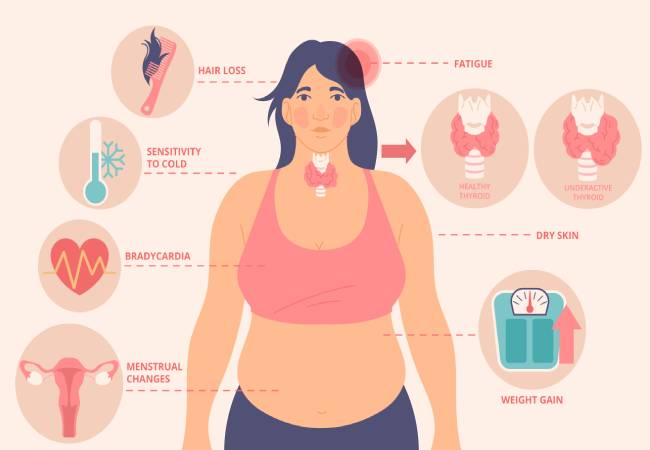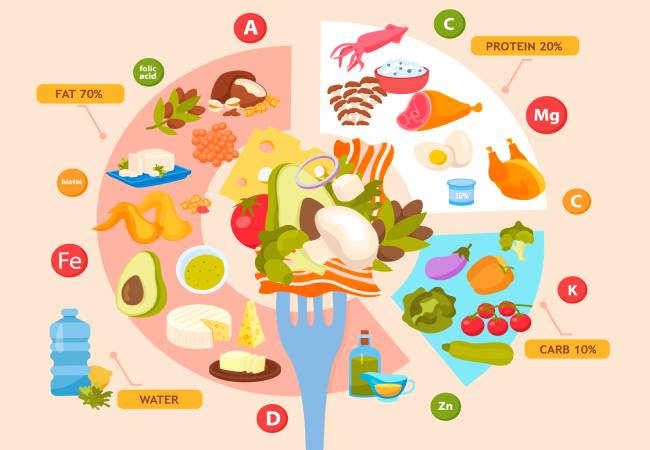The Impact of Lifestyle on Hormonal Balance: Endocrinology and Well-being
The extremely subtle relationship between special nutrients, various dietary regimes and general nutrition may either be beneficial or detrimental to hormone balance. Diversified eating patterns, ranging from frequent fasting to excessive calorie intake, and foods that are high in glycemic index are attributed to specific hormone level fluctuations. Take, for instance, the fact that the regulation of thyroid hormones is in response to the fed or fasting state, and qualified nutrients such as selenium, iodine, and iron are important with regard to thyroid hormone levels. Furthermore, nutrient intake affects not only overall energy consumption but also the hormone cortisol, which is involved in academic studies, as well as specific nutrients such as fish oil.
Undoubtedly, one of the most important issues to consider when it comes to nutrition and its influence on hormone levels is the impact it might have on hormone sensitivity. Put more simply, is there any shift in the way in which cells respond to hormonal signals as a result of dietary factors?
Glands and Hormones
The endocrine system consists of an interconnected network of different glands that perform particular functions, producing specific hormones. Let's find out some essential contributors to this intricate system:
Thyroid Gland
This organ largely controls metabolism, energy, and body temperature through hormones like thyroxin and triiodothyronine. Thyroid imbalance, characterised by dysfunction, could present with many symptoms, including fatigue, weight changes, temperature sensitivity, hair loss, dry skin, mood swings, and menstrual cycle disruptions. Secondly, people are also prone to muscle weakness, joint pain, and an inability to focus.

Pancreas
The pancreas is one of the most important organs that manages the blood sugar level by releasing necessary hormones called insulin and glucagon, which are essential in maintaining the correct level of glucose in the body. Unbalanced insulin, more often linked to insulin resistance or diabetes, may lead to rapid weight loss, constant fatigue after meals, constant hunger, dark skin patches, increased urination, excess thirst, vision changes and slower wound healing. See a medical doctor if you experience these symptoms and need help.
Adrenal Glands
The major glands deal with the body's response to challenges and stressful situations by releasing stress hormones like cortisol and adrenaline. Symptoms of adrenal gland imbalance, typically accompanying conditions like adrenal fatigue, could include chronic fatigue, body aches, gastrointestinal distress, weight gain or weight loss, low blood pressure, skin rashes, sleep disturbances, emotional instability, and intense cravings. If you sense signs such as disorientation, memory lapses, or a reduced capacity to perform daily tasks, it is necessary to consult a doctor for proper evaluation and consultation.
Ovaries (women) and Testes (men)
Reproductive organs are the glands that produce sex hormones, namely estrogen and progesterone in women and testosterone in men, which are responsible for sexual development and all reproduction processes, including fertilisation, implantation, and parturition. Signs of the hormonal discrepancy in the ovaries and testes of women and men may appear in different ways. In addition to this, the frequency and schedule of periods, female sex drive, and mood changes may occur. While testosterone is essential in enhancing libido, males may experience low libido, erectile dysfunction, infertility, and a loss of muscle mass.
Understanding Hormonal Imbalances: Adverse Effects on Health
Hormone imbalance may be the beginning of the link between the endocrine system and other bodily health damages in multiple ways. If thyroid hormones are misaligned, the metabolic system is disturbed, causing weight loss or gain, persistent tiredness, and abnormalities in the body temperature. The thyroid's most important function is energy expenditure, which is metabolism; it indicates how wide the impacts can be. Insulin deficiency or impairment of its duties, which usually accompanies hormonal disturbances, can trigger a diabetic condition in which blood sugar levels do not receive the required management from the body.
5 Low-Cost Strategies to Increase Your Healthy Endocrine System Metabolism
1. Balanced Nutrition
Choose a diet that gives you balance with whole foods like fruits, vegetables, lean meat, and whole grains, respectively. Adequate intake of indispensable nutrients such as selenium, iodine, and iron is a fundamental constituent of good health, and omega-3 fatty acids assist in hormonal balance. Completely abstaining from too many processed foods, sugar, and unhealthy fats may be affecting factors of endocrine function.

2. Regular Exercise
Incorporate into your everyday regimen, including aerobics and resistance training. Exercise assists in maintaining an appropriate insulin level, improving metabolic function and reducing the adverse effects of stress hormones. Set yourself a minimum of 150 minutes per week of moderate exercise to maintain hormonal balance throughout your body.
3. Quality Sleep
Ensure you satisfy your sleep requirement and aim for good quality, whereby you can get 7 to 8 hours each night. Adequate sleep is responsible for circadian rhythms, the release of some growth hormones, and lower cortisol levels. Build your sleeping habits for the day to improve hormonal balance and overall health.
4. Stress Management
Try stress-reducing practices like mindfulness, meditation, or deep breathing to relieve anxiety. Chronic stress raises cortisol levels, which influences hormonal balance. Utilise relaxation methods in your daily life to counter the danger of stress hormones to your health.
5. Reduce Your Exposure to Environmental Toxins
Decrease exposure to complex chemicals acting on the endocrine system found in plastics, pesticides, and home products. Be sure to be particular about your personal care products, making sure that you choose those with fewer synthetic chemicals as they may disrupt your hormonal balance.
Conclusion
The revealing relationship between the way we live and the fluctuations of our hormone levels commands us to be sensible in our predicaments to enhance our well-being. By embracing healthy habits, reducing exposure to detrimental basics, and championing wider societal transformation, we can hack a well-designed symphony of hormonal health, resulting in a happier and better life. Note that this article aims to be only informative and doesn't in any way suggest or substitute any medicinal consultation. It is best to consult a healthcare professional when advised on personalised therapies.






